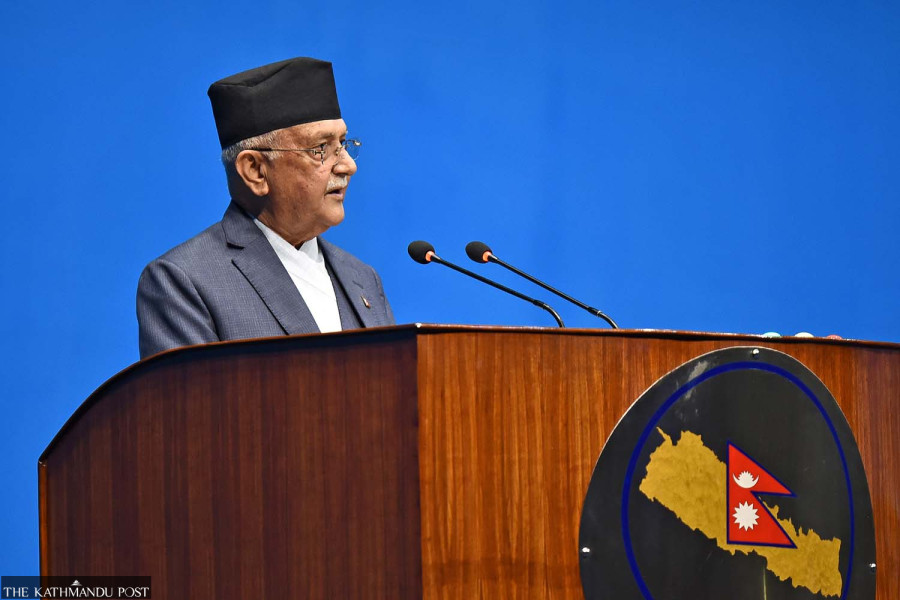Politics
Oli defends government with ‘rosy’ achievements
The Congress-UML coalition will last until 2027, the prime minister reiterates.
Post Report
Prime Minister KP Sharma Oli, claiming that his government had made remarkable achievements on various fronts, on Wednesday reiterated that the ruling coalition would continue until the 2027 general elections.
Appearing before the House of Representatives to present an annual report card of his government, Oli accused the opposition of trying to derail political and policy stability, while ignoring the “substantial achievements” seen in governance, infrastructure and the economy under his leadership. The current Oli government was formed in July last year with the support of the Nepali Congress, the largest party in Parliament.
“When we came into government, we pledged to bring national politics on track, revitalise the economy and end instability,” Oli said. “We have largely attained what was pledged. Yet, instead of trying to learn from what was done, we have been dragged into meaningless debates filled with insults, blame and provocation.”
His lengthy speech with a laundry list of what was done started with a barb on Rastriya Swatantra Party chair Rabi Lamichhane and the party leadership. Without naming names, Oli ridiculed claims that the detention of certain cooperative fraud suspects was politically motivated, noting that “hundreds” of individuals including former deputy prime minister, ministers and mayors were in custody for misappropriating billions of rupees.
“If one case is revenge, why are all the others lawful?” he asked. “The crowds that blindly follow such narratives not only surprise, but are pitiable.” Further attacking Lamichhane, he said, “Those who went abroad on visit visas, married multiple times, took foreign citizenship without renouncing one, and returned to Nepal to become ministers are claiming that all the people boarding a plane are flying out in clandestine settings.”
Criticising the opposition for spreading rumours that his government would fall, Oli said that with support from the Congress and other parties, it stands on a strong parliamentary foundation.
“No matter how much instability is desired, this coalition will continue until the 2027 (2084) elections,” he said adding its continuation was necessary to the instability in politics and policy, establish policy stability and lead the country towards the path of prosperity.
While counting his government’s achievement, he listed out the operation of a bridge connecting Humla’s Simkot to the national network to the 112 billion cubic metres of gas discovered in Dailekh and iron ore deposits in Nawalparasi, which he said would boost self-reliance in fuel and steel. He did not leave to mention the installation of floodlights and parapets at Kirtipur Cricket Stadium, claiming plants were afoot to expand infrastructure development nationwide.
Comparing the progress made in the legislative front, he claimed that while 23 bills have been passed since he became the prime minister, only 14 were passed during the 18 months of the erstwhile Pushpa Kamal Dahal government.
In transport, he said the Narayangadh-Butwal road upgrade has seen 70 percent completion, tunnels like Nagdhunga-Naubise and Siddhababa were progressing and the Gwarko overpass in Lalitpur has become operational. He further claimed that construction of the Kathmandu-Tarai expressway was going on at a rapid pace. He, however, didn’t mention that around a decade since construction began, successive governments are yet to complete land acquisition needed to construct the entry point of the national pride project.
Oli didn’t forget to list the increased success rate in the Secondary Education Examinations as an achievement of his government. The pass rate in the test jumped 14 percent while the pass percentage in grade 12 grew by nine percent.
He said that treatment for cancer, heart, burn, and kidney patients had been expanded and HPV vaccination was made part of regular vaccination. On the goal of establishing one basic hospital in every local unit, 55 have come into operation, Oli added.
The economy, he said, had grown 4.6 percent, up from the 3.7 percent growth of the previous year, adding Rs400 billion to the Gross Domestic Product. Revenue collection rose 11.3 percent, remittances hit Rs1.53 trillion—up 15.5 percent, exports reached a record high, and foreign exchange reserves could now pay for 14.7 months of import, the prime minister said.
Nepal earned Rs17.45 billion from India and Rs260 million from Bangladesh selling electricity, claiming the revenue to be significantly higher than what the previous government grossed.
Asking for an optimistic evaluation, Oli said, “The work of his government is half full, not half empty.”




 9.12°C Kathmandu
9.12°C Kathmandu














